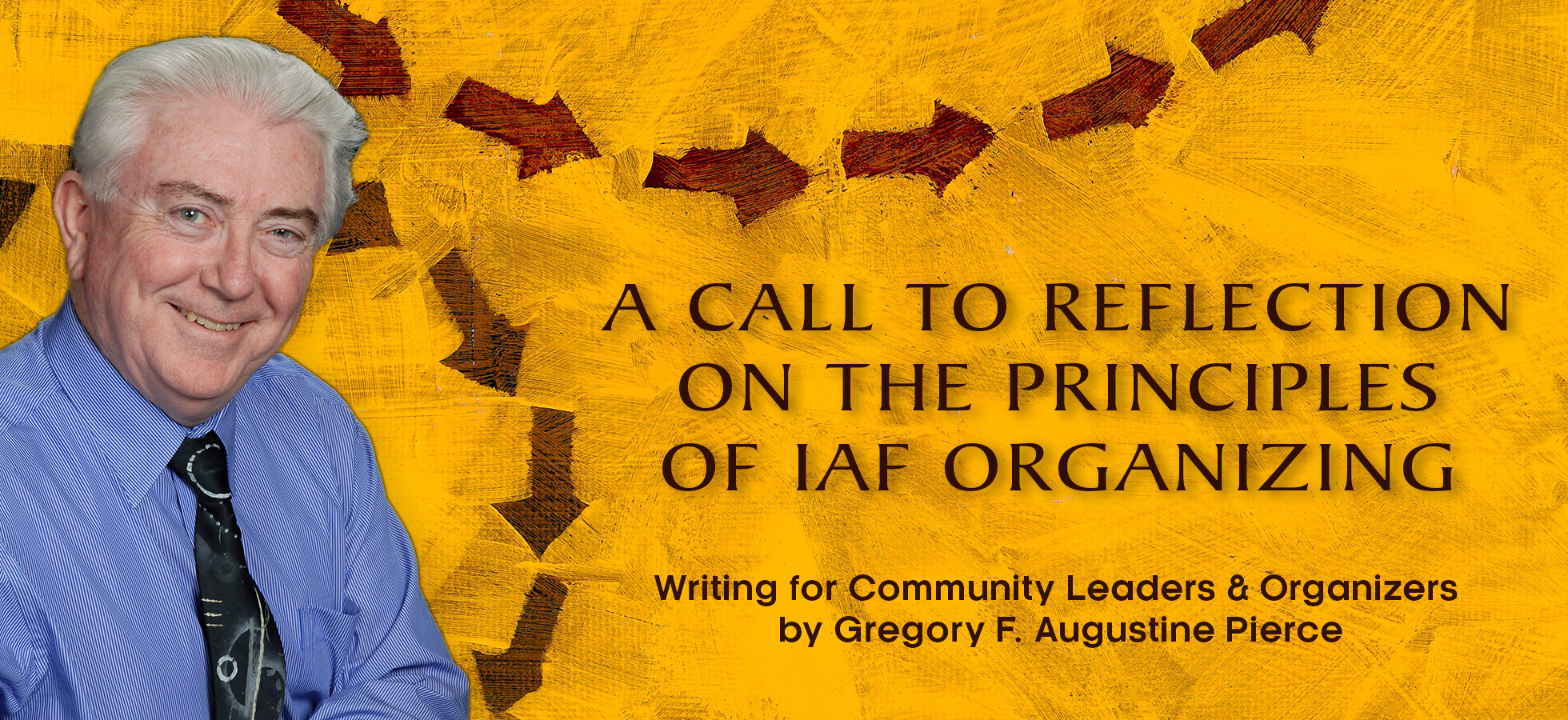Recent Posts
- Home
- ACTA Justice
- A Call to Reflection
A Call to Reflection
Posted by on
© 2020 Gregory F. Augustine Pierce
This blog is an attempt to convince community leaders and organizers that writing can be another tool in their power toolbox. It offers examples and suggestions on how to write both artfully and effectively. I have been a publisher for over thirty years and a community leader and organizer for almost fifty years, so the combination of these two topics is a natural for me, as in this piece.
The idea that change usually comes incrementally, over a long period of time, as people build their own organizations that can then address the root causes of social problems (“root” being the very definition of the word radical) is newly relevant during the triple-headed crisis we are going through in the world today. The Industrial Areas Foundation (IAF), with which I have been connected for over 50 years, has certainly been a proponent of this approach. We try to break “problems” down into “issues” that we can “do something about” with the “power that we have” or “the power they think we have.”
Why do we take this approach? I believe we have to think about and discuss this now, before the pandemic is over, before the election of 2020 is decided, before we try to address the problems of racism and racial inequality, before we tackle the problems of a failed economy. Before we return to “normal,” that is: There will be a new “normal,” and we need to prepare our response to it.
As a starting place, I have been thinking about what has made the IAF approach unique and compelling over at least the eighty years of its existence since its formation by Alinsky in 1940. I have been helped in this by my current role in trying to get IAF leaders and organizers to write about their experiences. This fall, my publishing house, ACTA Publications, will publish two books. The first is Lessons Learned: Stories from a Lifetime in Organizing by Arnie Graf, one of the most authentic practitioners and teachers of the universal principles of the IAF; the second is Reveille for a New Generation: Organizers and Leaders Reflect on Power, which is my compilation of some 45 essays by predecessors of the IAF, founders of the IAF, and new leaders and organizers of the present-day IAF.
Here is what I understand about the “IAF” approach to organizing: It is built on these five “pillars” or “universal principles”:
1. To be effective over the long haul, IAF organizations must be non-partisan. Not “non-political,” but not beholden in any way to elected officials or political parties, including taking their money or endorsing their candidates.
2. To be effective in the long haul, IAF organizations must be diverse in as many ways as humanly possible in each situation: by race, ethnicity, faith and philosophy, political persuasion, economic circumstances, education levels, gender identity, sexual orientation, geography, etc. This diversity must be real not token, non-negotiable, and absolutely non-exclusionary.
3. To be effective over the long haul, IAF organizations must be either made up of “people’s institutions” (defined as institutions that the people who are members have—or should have—control over) or be new people’s institutions that are organized with all the elements of other people’s institutions (i.e., organized people and organized money) such as labor unions, not-for-profit service providers, ethnic and civil rights organizations.
4. To be effective over the long haul, IAF organizations must be based on “relational” power rather than “dominant” power. This kind of power is developed through the IAF practice of one-to-one and small-group relational meetings. “We build relationships now so we will have them when we need them,” is the IAF mantra.
5. To be effective over the long haul, IAF organizations must follow the “Iron Rule”: Never do for people what they can do for themselves. Thus, IAF organizations are based on a long tradition of leadership training and development, reflection and mentoring, reading and power analysis, and action and evaluation.
This blog is meant to get this conversation started as we all hit the ground running on November 4, 2020, and beyond. Do any of these five pillars or universal principles of the IAF approach to organizing need to be changed or tweaked? As we recruit new member institutions or build new affiliates, as we look for and develop new leaders and organizers, as we get into new and effective action on a wide range of issues, as we think regionally and nationally as well as locally, as we confront our own weaknesses and failings, are these the universal principles we need to restate and recommit to? Are there any other pillars that need to be added?
If you are interested in joining this dialogue, please send me a response of about 1000 words (the length of this piece). I ask only that you focus your comments on this question: What makes the IAF approach to organizing described above unique and compelling to you? Be specific. Give examples. Tell stories.
Greg Pierce is the supervisor of the Illinois affiliates of the Industrial Areas Foundation, with which he has been connected as an organizer, leader, and mentor for fifty years. He is the compiler and editor of Reveille for a New Generation, the developer and facilitator of the workshop “Persuasive Writing for Community Leaders and Organizers,” and the publisher of a series of reflections on organizing published by ACTA Publications, www.actapublications.com. He can be reached at gfapierce@aol.com or 773-590-3801.
 Loading... Please wait...
Loading... Please wait...

